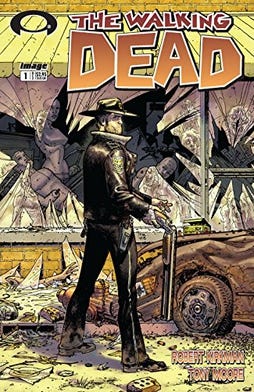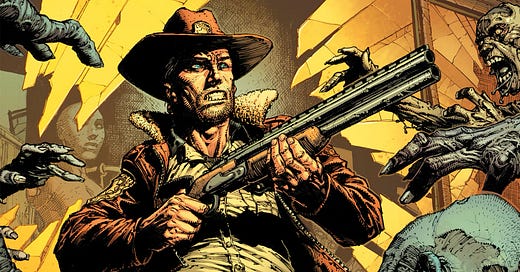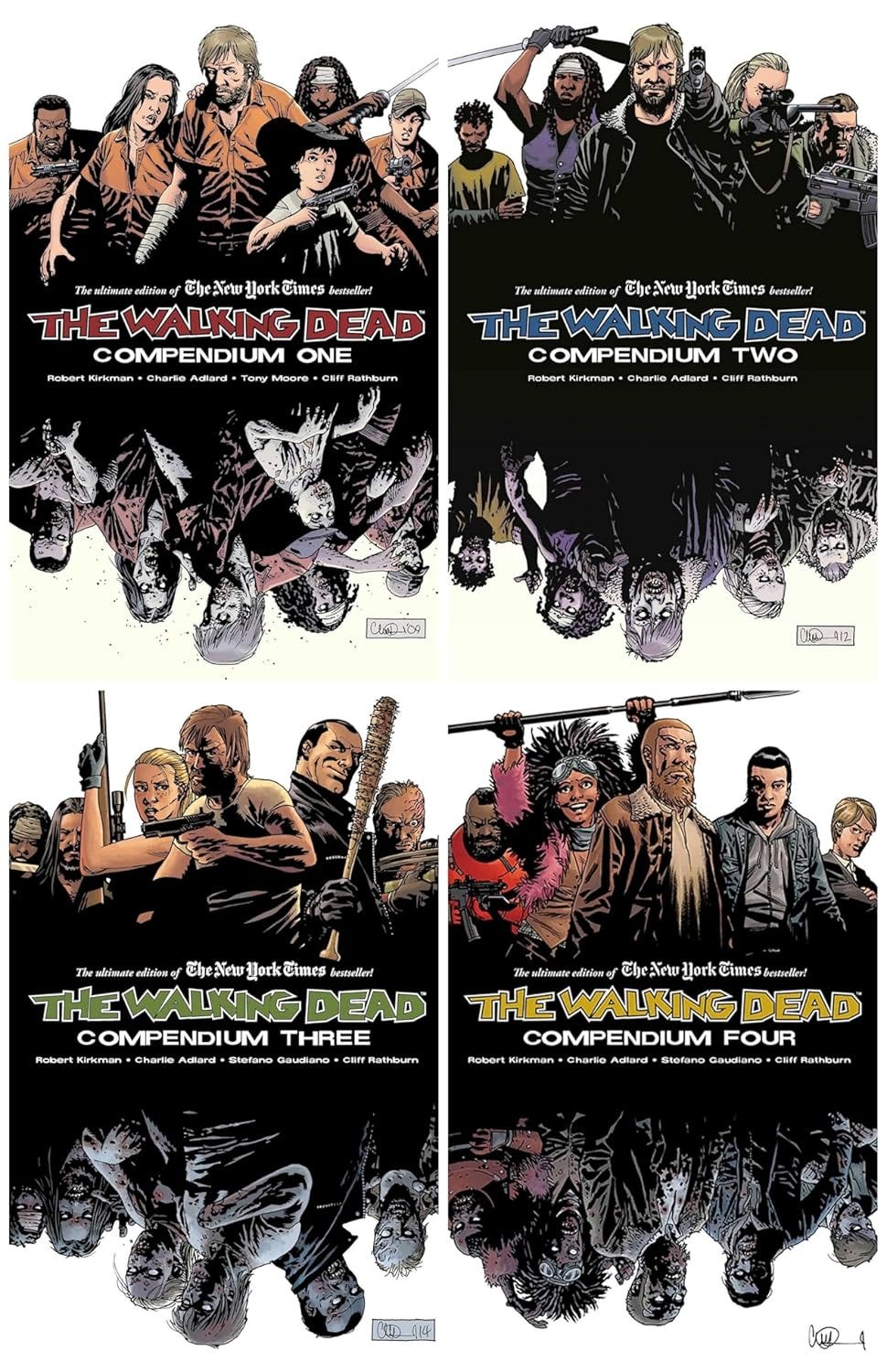The Walking Dead Comics: The Definitive Survival Story That Redefined the Genre
More Than Just Zombies—A Reflection on Society, Morality, and What It Means to be Human
When The Walking Dead debuted in 2003, few could have predicted that Robert Kirkman’s gritty comic series would launch one of the most dominant franchises in modern pop culture. While many fans first encountered The Walking Dead through AMC’s long-running TV adaptation, it's the comic series that remains the most unflinching, uncompromising, and ultimately profound vision of Kirkman’s post-apocalyptic world.
A Story About People—Not Just Zombies
At its heart, The Walking Dead isn't a story about the undead. It’s a study of human nature when stripped of societal structures. Kirkman understood that in the aftermath of a civilization-ending event, the greatest threat isn’t the zombies—it’s other people.
“Fight the dead. Fear the living.”
This core philosophy drives the series forward, forcing its characters to navigate impossible moral dilemmas. What does it mean to hold onto humanity when survival often demands cruelty? What kind of leader emerges when law and order no longer exist? The Walking Dead doesn’t provide easy answers—it demands that both its characters and its readers wrestle with these harrowing questions.

Why The Walking Dead Still Resonates Today
I first stumbled upon The Walking Dead comic series in the fall of 2007 during a visit to my local comic book store. A single issue caught my eye, and as a lifelong fan of the zombie genre—rooted in George A. Romero’s Night of the Living Dead and Richard Matheson’s I Am Legend—I was immediately intrigued. Growing up, I devoured zombie flicks and B-movies, so the premise alone sold me. But it was the artwork that truly hooked me.
The moment I flipped open that first issue, I was mesmerized by the stark black-and-white aesthetic—something I hadn’t experienced in a comic before. Unlike their vividly illustrated covers, the interior pages were stripped of color, making them feel raw and unfiltered. The absence of color didn’t hide the horror—it amplified it. I binge-read every issue I could get my hands on, absorbed in the grim, unrelenting world Kirkman and artist Tony Moore had created.

By the time 2010 rolled around, my enthusiasm for The Walking Dead comics remained strong, but the launch of AMC’s television adaptation reignited my excitement in a whole new way. Seeing Robert Kirkman’s grim world brought to life in live-action, bolstered by strong performances (especially Andrew Lincoln as Rick Grimes), made me hungry to revisit the comic series with fresh eyes. I was both eager to compare the show’s adaptations of key moments and grateful that the comic offered a rawer, unfiltered version of the story that television couldn’t fully capture due to network limitations. The TV series kept my appreciation for The Walking Dead universe alive. It wasn’t just about the adaptation itself—it was the conversations it sparked, the anticipation of seeing iconic moments take new shape, and the realization that the comic series was still the purest version of Kirkman’s vision. It reminded me why I had fallen in love with the series in the first place.
In 2013—six years after I first discovered The Walking Dead—the World War Z movie brought zombies to blockbuster status, cementing the undead as pop culture mainstays. Around this time, survivalist themes and post-apocalyptic storytelling were experiencing a surge in mainstream media, fueled by concerns over emerging virus outbreaks and the growing popularity of doomsday prepper subcultures. The Walking Dead thrived in this era, resonating with audiences who found its themes of leadership, survival, and moral ambiguity more relevant than ever.
Now, in a post-pandemic world, the themes of The Walking Dead feel even more relevant. With flu outbreaks, rising inflation affecting basic necessities, and political unrest dominating headlines, the comic’s exploration of societal collapse, survival ethics, and human resilience has only grown more poignant. Kirkman’s vision wasn’t just about horror—it was about how civilization crumbles, and more importantly, how people choose to rebuild it.
Would I still recommend The Walking Dead today? Without hesitation. While newer, colorized versions have been released for those who prefer them, I firmly believe that the original black-and-white format is the definitive way to experience this harrowing survival epic.
The Art That Tells a Story
One of the comic’s boldest artistic choices was its black-and-white aesthetic. While some fans wished for color, this decision made The Walking Dead visually timeless, raw, and more unsettling.
🖤 Why Black-and-White Works:
It removes excessive stylization, forcing readers to focus on expressions, body language, and atmosphere.
It intensifies the horror—you’re not distracted by flashy gore; instead, you feel the weight of every brutal moment.
It reflects the world’s moral ambiguity—without color, everything is metaphorically (and literally) in shades of gray.
In 2020, Kirkman's team re-released select volumes in color, offering a drastically different experience. While visually interesting, most longtime fans agree: The Walking Dead is at its most impactful in black and white.
Final Verdict: Is It Worth Reading?
✔️ YES! If you're a fan of post-apocalyptic fiction that delves deep into human psychology and survival ethics.
✔️ YES! If you enjoyed the Walking Dead TV series but want a sharper, unfiltered version of the story.
✔️ YES! If you appreciate emotional, long-form storytelling with genuine character growth over time.
That said, be prepared for its unrelenting bleakness. This is not a story with easy resolutions—it demands emotional investment. But if you're willing to take the journey, you’ll find one of the greatest long-form narratives in modern comics.
Rating: ★★★★½ (4.5/5)
✔ Emotional Depth: This isn’t just a zombie thriller—it’s an intense character study, filled with deeply human moments among the horror.
✔ Stunning Artwork: Charlie Adlard’s stark black-and-white visuals lend the comic a timeless, cinematic quality.
✔ Consistent Thematic Weight: Almost every issue examines moral ambiguity, survival ethics, and the fragility of civilization.
✖ Why Not a Perfect Score? The pacing in later volumes sometimes drags, especially when large communities like the Commonwealth shift the focus away from personal survival.
📌 Where to Buy: The Walking Dead Complete Series on Amazon






